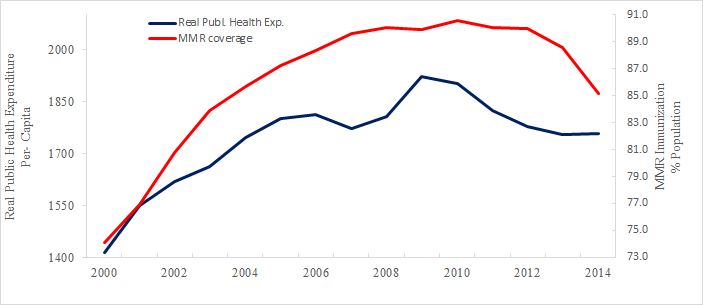
Healthcare Cuts Strongly Linked to the Resurgence of Measles
MEASLES, MUMPS, RUBELLA (MMR) VACCINATION COVERAGE DECREASED 0.5 PERCENTAGE POINTS FOR EACH 1% REDUCTION IN PERCAPITA REAL PUBLIC HEALTH EXPENDITURE, ACCORDING TO A STUDY ANALYZING VARIATIONS IN FINANCING AND COVERAGE ACROSS ITALIAN REGIONSRecent trends show that primary reason for the measles outbreak, affecting several European countries, is the decline in vaccination coverage, for which mainly the ‘spread of anti-scientific theories’ can be blamed. However, it turns out it is not the only one.
A new study conducted by Bocconi scholars Veronica Toffolutti, Alessia Melegaro and David Stuckler, with Martin McKee (London School of Hygiene and Tropical Medicine) and Walter Ricciardi (President, Istituto Superiore di Sanità) shows that cuts in public health expenditure also play an important role, with measles, mumps, rubella (MMR) vaccination coverage decreasing 0.5 percentage points for each 1% expenditure cut. The research is published in the European Journal of Public Health.
The scholars compare MMR vaccination coverage at 24 months of age in 20 Italian regions with the respective per-capita annual real public health expenditure for the period 2000-2014, once considered the strength of the anti-vax movement.
“We observed that public health expenditure in Italy steadily rose from 2000 to 2009 at an average rate of 3.5% per year, while it dropped by about 2% per year between 2010 and 2014. Similarly, MMR coverage rose from 74.1% in 2000 to 90.6% in 2012, and then reversed its course, falling to 85.1% in 2014, far from the 95% herd immunity level”, Veronica Toffolutti says.

Since the cuts varied across regions, the authors can compare the effects of different variations and find that the regions that suffered the greatest budget cuts also recorded the largest decrease in vaccination coverage, while the regions that managed to increase their healthcare budgets were even able to improve their MMR coverage. Valle d’Aosta, for instance, suffered a 6% drop in healthcare spending and a 11% decrease in MMR coverage, while Sardinia, with a 2% increase in spending, recorded an immunization increase of 3.8%.
On average, a 0.5 percentage point decline in MMR coverage corresponds to a 1% cut in spending.
“Our analysis suggests that austerity measures adopted in Italy contributed significantly to the resurgence of measles”, the authors write. “Italy is now addressing its low vaccination rate, by a combination of legislation and budgetary increases. It will be important to monitor these developments, not only to inform policy in Italy but across Europe where many countries now face similar problems”.
Veronica Toffolutti, Martin McKee, Alessia Melegaro, Walter Ricciardi, David Stuckler, Austerity, measles and mandatory vaccination: cross regional analysis of vaccination in Italy 2000-14, in European Journal of Public Health, doi: 10.1093/eurpub/cky178.
by Fabio Todesco
